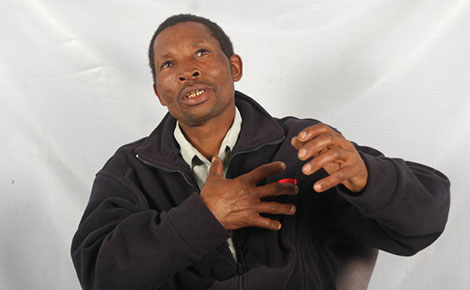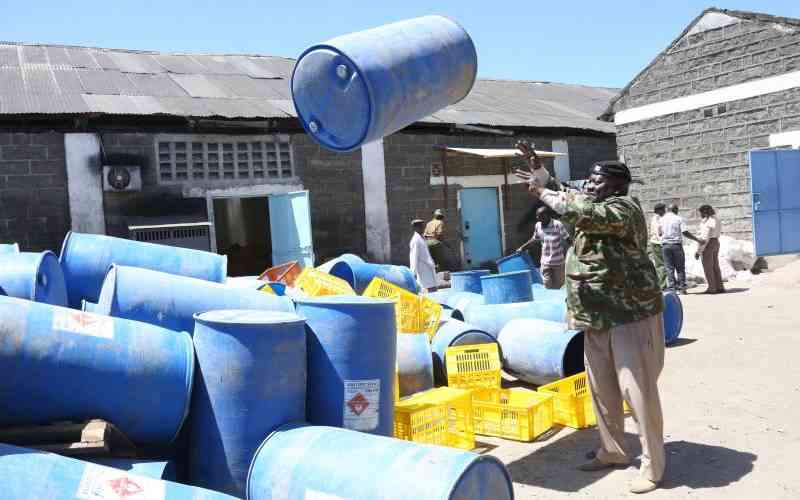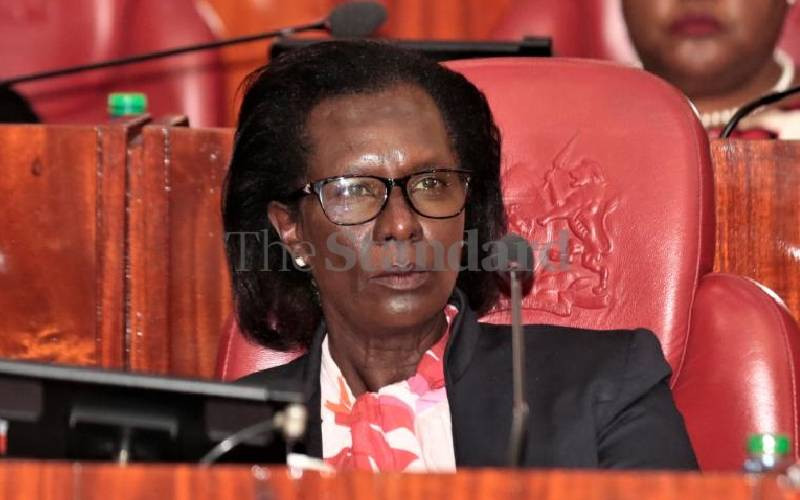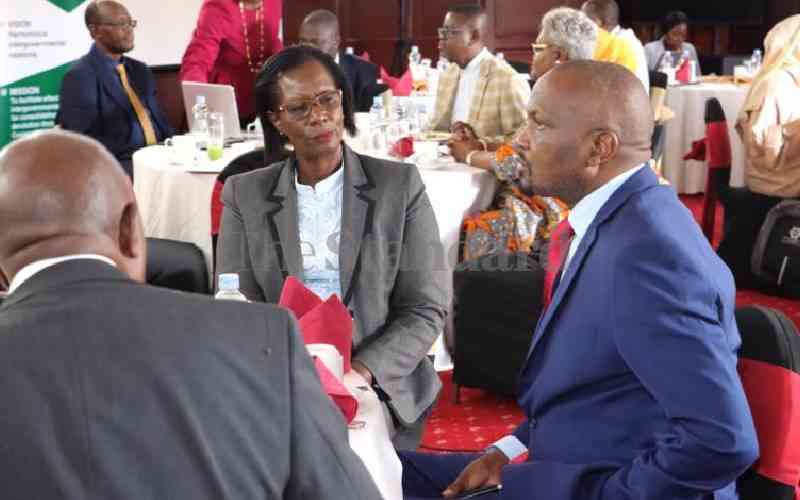 |
|
David Thuo during the interview. He is a breast cancer survivor. [PHOTO: JENIPHER WACHIE/STANDARD] |
One man has been courageous enough to proudly speak on what others would rather keep to themselves than face the shame and stigma.
David Thuo, was afflicted by what many regard a women’s condition. But he has been man enough to share his survivor story if only to help others suffering in silence or wallowing in denial.
As a breast cancer survivor, he even spares a joke or two about it, a year after effective treatment.
“Nilipata ugonjwa ambao mara kwa mara huwapata wanawake, lakini sasa sina aibu kuongea kuhusu saratani ya matiti kwa sababu nilipata matibabu kamili,” says Thuo.
He prefers the interview in the national language; Swahili and anecdotes in his mother tongue, adding that he prefers the two languages whenever he is creating awareness on breast cancer.
As calls for cancer screening peak this October, he speaks, for the first time, to the media about his journey on a topic that he once considered embarrassing.
FIRST PAINS
In 2012, Thuo was working as a farmhand in Kamangu, in Limuru when he began experiencing a pain on the left breast and the nape of his neck but nothing prepared him for this ‘women’s’ disease.’
“When the first pains began in an area that had swellings, I took pain killers but when the pain didn’t go for two years, my wife advised that I seek a doctor’s opinion,” he remembers.
The pain kept shifting towards the armpits and it got itchy with a pin-and-needles effect, prompting him to seek medical opinion.
“I had four continuous sleepless nights before I went to Nazareth Hospital where the examination by one doctor led him to call three more of his colleagues and as they palpated my breast, the expressions on their faces prepared me for the worst,” he remembers his first visit.
Laboratory tests revealed that he had early stage breast cancer and required treatment immediately. This sent him into a muddle of wonder, questioning how and why he had acquired the disease.
Prof Ronald Wamalwa Wasike, of the Breast Clinic at the Aga Khan University Hospital cautions that because men have poor health-seeking behaviours, most of them present to hospital with advanced stage of the disease, thus the survival rates for breast cancer in men largely depends on how far the cancer has spread before it is diagnosed.
Luckily for Thuo, his cancer was in stage one, providing optimism for more effective treatment but there lay a hindrance to this attainment.
As he walked home, he wondered how would break the news to his wife given that he was the breadwinner of the family. They had just began their sunset years with their children all grown up with their own families.
Stay informed. Subscribe to our newsletter
The costs of the treatment and management of breast cancer, he says, was an amount he could never dream of earning in his lifetime, leave alone raise to meet the cost of a life-saving treatment.
“One of the hospitals asked me to look for Sh1 million, yet I had never even held Sh100,000, so I resolved to sit back and wait for the Lord to either heal me or take my life,” he remembers his dejection.
His wife cried and he bit his tongue to keep from breaking down.
“In-between the tears, she vowed to support me adding that no disease was too embarrassing and that we would weather the storm,” he shares his wife’s reaction.
A teacher in one of the schools in Kikuyu, whom he had earlier worked for as a farmhand, helped him raise an initial Sh60,000 and his despair was turned into hope a week after the diagnosis. “I managed to get onto the welfare programme that enabled me get surgery that had seemed unachievable earlier,” he says.
SIDE EFFECTS
He is now on the first of five years of Tamoxifen, which inhibits oestrogen from stimulating the growth of breast cancer cells.
“I had saved Sh20,000 from my meagre jobs and this amount was rather embarrassing to declare for the treatment of breast cancer at a local hospital that estimated around Sh3000,000 initially,” says Thuo who works as a casual labourer on farms in Kikuyu.
Luckily, sponsors and a welfare programme at Aga Khan University Hospital, enabled him undergo treatment that began in October combining surgery, radiotherapy and chemotherapy.
“I underwent 20 radiotherapy sessions every day for one month, and my entire family supported me throughout even as I faced ridicule from some of my peers,” Thuo says.
Prof Wasike defines breast cancer as the development of abnormal cells that become growths. They present as lumps that can spread to other parts of the body if not detected and treated early, with the average size of breast cancer in men when first discovered being about 2.5 cm in diameter. Even with the ridicule, he warns men not to ignore some of the signs because it could be an abnormality including breast cancer, given that two out of every five men are diagnosed with breast cancer at a late stage, thus dampening chances of effective treatment.
“Self-breast examination in men uses the same techniques as in women. Female partners should also be proactive in helping their male partners check for lumps or changes in their breasts,” Prof Wasike advises.
Chances of developing breast cancer in men can be stimulated by hormonal medicines, being overweight or having a history particularly if other men in the family have had breast cancer.
“The boiling point of breast cancer in men is the female hormone known as oestrogen, whose variations in an individual has been known to trigger cancer,” Prof Wasike says, adding that the overall treatment approach for treating men with breast cancer is similar to that for women though men undergo a mastectomy instead of removal of the lump.
Masectomy is the removal of all breast tissue as a way to treat or prevent breast cancer.
After breast cancer has been diagnosed, staging is done to describe how far a cancer has spread at the point of the diagnosis.
“Treatment of both men and women are the same, which is either removal of the breast known as mastectomy, chemotherapy and radiotherapy or hormone treatment,” says Wasike.
Back to Thuo. His treatment came with a myriad side effects including very dark toe-nails and his hair fell off, known as alopecia, forcing him to resign from work. But he is glad he never lost his appetite, especially for fruits.
“I loved watermelons, pawpaws and mangoes either as wholesome fruits or blended because they replaced my nutrients and energy lost during my course of treatment,” Thuo says.
STOP SHYNESS
To date, he has kept one of the toe nails that came off as a memoir of the treatment days.
His hair also unceremoniously fell during showering and it least bothered him because he had been prepared that it could happen during the course of treatment as a side effect.
So dedicated was his family to his being healthy that they sacrificed some of their savings from their meagre earnings to buy a generator to assist in blending fruits for him.
He urges couples, family members and friends not to desert patients diagnosed and being treated for cancer because they are the cornerstone from which they draw their support.
“My wife took care of me like a child and prompted me to eat in small portions even when my body rejected it,” Thuo says, adding his mother, who lives less than 50 metres from his homestead also came to check on him daily.
His elder brother, John Ndungu, volunteered to accompany him to hospital for treatment every day of the week, wait for him and later take him home.
“He had retired a few weeks earlier, yet he sacrificed to take me to hospital and even contributed to my treatment with some of the benefits from his retirement package,” Thuo says.
That he had stopped indulging in alcohol and cigarettes before diagnosis encouraged treatment, he says.
He urges men not to be too shy to seek treatment even for condition that have mythically been associated with women.
 The Standard Group Plc is a
multi-media organization with investments in media platforms spanning newspaper
print operations, television, radio broadcasting, digital and online services. The
Standard Group is recognized as a leading multi-media house in Kenya with a key
influence in matters of national and international interest.
The Standard Group Plc is a
multi-media organization with investments in media platforms spanning newspaper
print operations, television, radio broadcasting, digital and online services. The
Standard Group is recognized as a leading multi-media house in Kenya with a key
influence in matters of national and international interest.
 The Standard Group Plc is a
multi-media organization with investments in media platforms spanning newspaper
print operations, television, radio broadcasting, digital and online services. The
Standard Group is recognized as a leading multi-media house in Kenya with a key
influence in matters of national and international interest.
The Standard Group Plc is a
multi-media organization with investments in media platforms spanning newspaper
print operations, television, radio broadcasting, digital and online services. The
Standard Group is recognized as a leading multi-media house in Kenya with a key
influence in matters of national and international interest.









